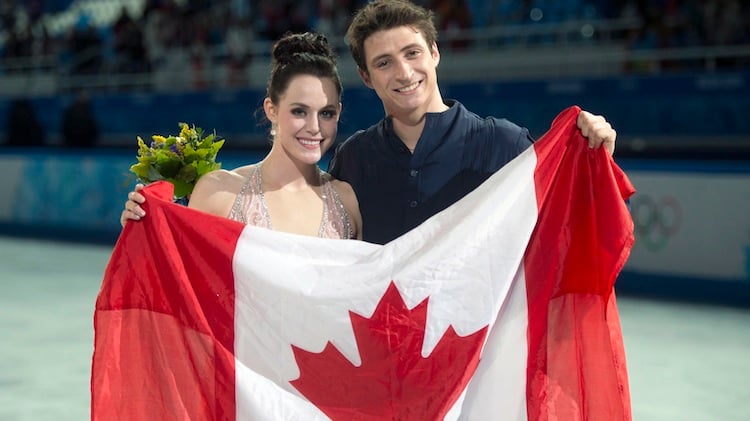True champions
Tessa Virtue and Scott Moir skate their hearts out to silver
Ice dance silver medallists Canada’s Tessa Virtue and Scott Moir pose with the Canadian flag during flowers ceremony at the Sochi Winter Olympics Monday, February 17, 2014 in Sochi. THE CANADIAN PRESS/Paul Chiasson
Share

In the end, there was more a sense of relief, than disappointment.
Tessa Virtue and Scott Moir came to these Olympics knowing they were number two in the eyes of ice dancing’s judges. On the last five occasions that they had squared off against Meryl Davis and Charlie White of the United States, they had lost. And the same script played out yet again at the Iceberg Skating Palace in Sochi.
Virtue and Moir gave another inspired performance in the free skate, sprinkling bits of grace, passion and a sense of fun over four minutes and winning the hearts of the capacity crowd. Their score of 114.66 was a season’s best, and set them comfortably in first place
But when Davis and White took the ice a few minutes later and delivered their own flawless skate, it was clear that the gold had slipped from the Canadians’ grasp. The pair scored 116.63 and took the top step of the podium—the 15th gold medal for the United States in Olympic figure skating, but the first to come outside of the mens or ladies competitions. And Virtue and Moir had won their second silver of the Games.
Afterwards, the two couples celebrated together on the ice. They share the same coach, Marina Zoueva, and have training together for the better of a decade at a rink in suburban Detroit. In the run up to Sochi, the media had sought to portray them as rivals, but the truth is more complex. They’ve grown up together, are friends, and for years have been each others only true competition.
“No athlete wants to be in second place. You come here to win,” Moir said later. “But it is easier when you see how hard these guys work everyday. Regardless of what style you prefer, it was a very well-deserved medal.”
In Vancouver, it was Virtue and Moir, then ranked number two in the world, who wrenched away the gold with a transcendent long program, consigning the Americans to silver. Between 2010 and 2013, they have alternated as world champions. But lately it seems that the more classical style of Davis and White has found greater favour with the judges.
In the short dance on Sunday night, Virtue and Moir gave an inspired performance that had them, and the crowd at the Iceberg Skating Place convinced they had carried the night. But their score of 76.33 was more than a point below their season’s best. The judges had given the Canadian pair a level three, instead of the highest level four, on their “finnsteps,” a 36 second segment of fancy footwork that all the couples must perform. The error, which cost them a couple of points, certainly wasn’t visible to the untrained eye. Or the trained one either as it turned out. Petri Kokko, the Finnish ice dancer who invented the moves along with his partner Susanna Rahkamo, took to Twitter to convey his dismay. “I don’t understand the judging in #ice dancing,” he wrote. “@Virtue_Moir should be in the lead in my honest opinion.”
Davis and White, the number-one ranked couple in the world, took to the ice a few minutes later to deliver their own short dance. It was more staid, and didn’t wow the fans the way the Canadians had. But the judges certainly found it superior, awarding them a world record score of 78.89.
Many figure skating fans, especially Canadian ones, saw a conspiracy. After all, the French sports paper L’Équipe, had published an anonymously-sourced story just before the Games began suggesting the fix was in. The Russians would win the team event and in turn, the U.S. would take home the ice dance gold. But there has been no hard evidence presented. The Russians won the team gold on their own merits, and the ice dance judging was consistent with what has happened over the last two years. Virtue and Moir were repeatedly asked if they thought that there was something fishy going on. So too were Davis and White. But they never really rose to the bait. It’s a judged sport, was their answer, fairer then it used to be, but still subjective. It’s a reality they all absorbed and consented to years ago. “You learn it early,” said White. “When you’re 11-years-old and you deliver what you think is the skate of your life and you don’t receive the marks you think you deserve.”
Moir hinted broadly that this is the end of his and Virtue’s Olympic road. Although they are only 26 and 24, they have been skating together since he was 9 and she 7. “There’s a lot of sleepless nights that go into an Olympics,” he said.”I think if only I could have been that 22-year-old whose dreams came true in Vancouver, again. But the reason we stayed was because we wanted a different journey.”
Their ice dancing silver was hard won and honourable. It will hold no bitter memories. Nor will it taint their relationship with Davis and White. Virtue talked about all the shared experiences they have had, the kind that few others have lived. Fifty years from now, she said, they still expect to be friends. Two of their sports’ greatest champions. Forever 1A and 1B.